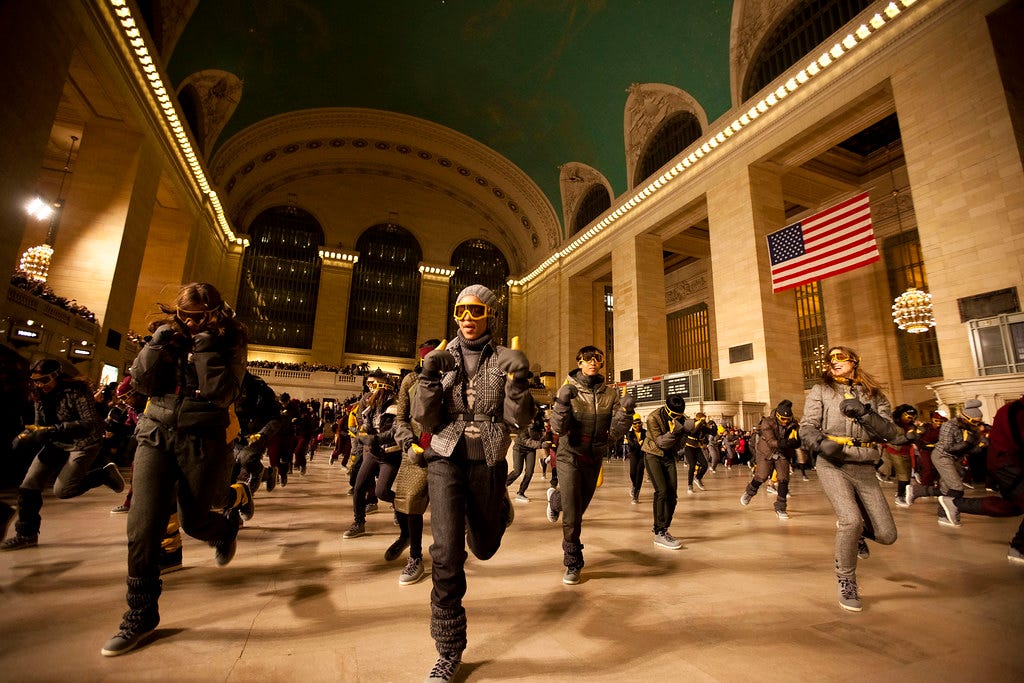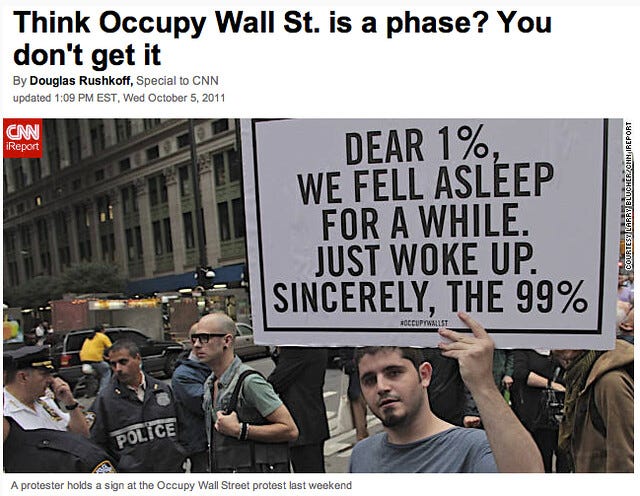Welcome to the Age of Hyperpolitics
How we’re all in the same boat, and we're going to sink it
Remember the summer of 2020? The ever-present protests? All the political energy, and the seemingly unstoppable momentum of the Black Lives Matter (BLM) movement? As we look ahead to a second Trump administration, that era feels so far away that it might as well have been back in the 90s.
Quotes from that summer seem now quaint and naïve, but they were reasonable at the time. A scholar of social movements, Douglas McAdams, told The New York Times, “We appear to be experiencing a social change tipping point — that is as rare in society as it is potentially consequential.” Depending on which polls you believe, up to a full ten percent of the American population protested against police brutality in those months. And then, poof.

We live in an era in which Americans seem to be more politically engaged than ever. Rates of protest activity has dramatically increased among citizens of all political stripes. We’ve not only seen BLM movement, but also “freedom truckers”, anti-drag show demonstrations, environmentalists gluing themselves to roadways, and ongoing housing protests.
Yet, the political consequences of these engagement has been anything but consequential. All thunder and no rain. We have an increasingly politically engaged polity that nevertheless practices relatively inconsequential politics. According to Oxford University historian Anton Jäger, that makes for a volatile, destabilizing combination. Our greatest challenge lies in finding our way out.
From Mass Politics to Hyperpolitics
Jäger explains how politics got so weird in his recent book Hyperpolitik. The book is in German, but Jäger has written a few English-language articles on the topic (something I partly wish that I had known before I slogged through the book!).
Jäger divides the last hundred years of politics into four distinct eras. The early 20th century was characterized by “mass politics.” This was the era in which, for better or worse, citizens belonged to political organizations. They weren’t just card carrying party and/or union members, but committed considerable time and effort to attending meetings, organizing events, and bonding with their comrades.
Such politics were built for and, in turn, gave birth to “mass men.” Jäger quotes German historian Eric Hobsbawm comparing the collective effervesce of a socialist rally to the pleasures of sexual intercourse. Hungarian philosopher Gáspár Miklós Tamás recognized that the immense sacrifices people were willing to make was possible only because the political movements of the era functioned like religious sects. And, of course, mass men were simultaneously capable of both great generosity and extreme cruelty, as the world experienced in the bloody battles between the mass ideologies of fascism and communism.
The decline of mass politics paralleled the general decline of social belonging. The work of Robert Putnam is, as a result, unsurprisingly central to Jäger’s analysis. The Harvard sociologist is famous for his book, Bowling Alone, which wasn’t so much about growing loneliness but rather the decline of civic life. The problem was not that Americans were really bowling by themselves, but that they did so sporadically with friends rather than in organized bowling leagues.

Like other observers of political life, going back at least to De Tocqueville, Putnam saw associational life as the schoolhouse of democracy. Bowling leagues not only brought diverse citizens together in regular contact, but the organizational work and disagreements involved in making them happen was good practice for mass politics.
When asked how they went bankrupt, a character in Ernest Hemingway’s The Sun Also Rises replied, “Two ways…gradually and then suddenly.” So it was for the death of mass politics. Growing affluence allowed Westerners to assure their material wellbeing through consumption, and less through social belonging and collective political action. Declining social capital, however, was just the slow drip. The sudden loss arrived with the collapse of the Soviet Union.
As often maligned and misunderstood as Putnam’s Bowling Alone, Francis Fukuyama’s book, End of History and the Last Man, can be read, at least in hindsight, as less about the end of political history but rather about the death of mass politics as we knew it, about the arrival of post-politics. The apparent triumph of capitalist societies over communism led many citizens to disengage, to see politics as just a sideshow. All that really mattered anymore was assuring the stability of market- and consumption-based societies.
Politicians of the era were, for their part, equally post-political. UK prime minister Tony Blair, who was even from the Labour Party, declared, “There is no right or left politics in economic management today. There is good and bad.”
Obama and others reiterated this sentiment, framing political conflicts as rooted in a lack of education rather than legitimate political differences: “Mainly people—they’re just misinformed, or they are too busy…But if you give them good information, their instincts are good and they will make good [voting] decisions.”
Discontent, however, was simmering just beneath the surface, eventually erupting in movements like the Tea Party and Occupy Wall Street. Both, in each their own ways, were expressions of dissatisfaction with elite technocratic rule. The left railed against the big banks, which seemed to have an ever bigger influence on politics, in turn exacerbating economic inequality. Tea partiers, for their part, rejected George W. Bush’s willingness to embrace ever bigger federal projects, such as No Child Left Behind, and his abandonment of the conservative base’s ideological view on immigration.
But these movements weren’t exactly a return to the mass politics of the past. They were antipolitics. Occupiers eschewed the formal institutional structure of traditional political organizations. Attempts by Democrats to involve themselves were widely rebuffed as an effort to “co-opt” the movement. Unfortunately, widespread mistrust and rejection of “the establishment” only served to further distance Occupiers from the actual levers of power. Rejecting institutionalization enabled them to embrace ever more radical rhetoric (ironically often out-of-touch with a big chunk of the 99%), but came with the cost of self-stultification.
The Tea Party was just as much a political movement against the post-political politics of technocratic conservatism, but was far more successful at institutionalizing itself. It lives on in the congressional Freedom Caucus, which wields a level of power in the Capitol disproportionate to its membership roll of some 30 odd representatives. Even then, the cost of institutionalization was a weakening of its former ideological rigidity. It’s now the leading edge of the congressional effort to make alternative, Trumpian elites the new establishment, despite the movement’s ongoing embrace of populist anti-establishment rhetoric.
Opposition to Trump’s 2016 electoral victory did, of course, lead to the creation of groups like Indivisible. Although local chapters continue mobilize leftists in towns and cities across the country, their level of institutional development pales in comparison to even what minor parties could muster in the age of mass politics. For all the intense fear and anguish over a MAGA president, leftists continued to engage politics primarily as individuals. Sporadic attendance of public meetings, political donations, occasional protests, and no shortage of shrill online venting is what political participation means to the increasingly engaged electorate.
As such, we’ve moved from anti-politics to hyper-politics. Weak institutionalization is no longer so much a product of a principled opposition to establishment politics, but rather some combination of an unwillingness and an inability to cultivate and maintain the necessary social infrastructure. It’s politicking alone.
If many of the world’s citizens find parenthood, or even coupling with a real-life human, to be more trouble than its worth, how could they ever come to bear the social burdens of democratic politics?
This, in my view, is further visible in the left’s increasing apocalypticism. By this, I don’t just mean that they think that the world is ending but also that every political crisis or Trumpian executive order is taken to reveal the inherent and unchangeable degeneracy of American politics. Evermore consumed with the perceived imminence of the end times, citizens are, nevertheless powerless to do anything but spit out fire and brimstone sermons from atop of their digital soapboxes. The de-institutionalization of politics gives them no other outlet except for a public form of learned helplessness.
Hyperpolitics is the tragic culmination of the ongoing breaking apart of traditional sociological webs. It is, as philosopher Peter Sloterdijk saw it, the result of believing that democracy wasn’t the daily work of hammering out a collective life but rather was “a form of society that allowed [a person] to not have to think about the state and the art of living together.” Citizens have woken up to the reality that neither technocratic post-politics nor the radical cosplaying of anti-politics can deliver the goods, but democratic deskilling, or a kind of generational amnesia, leaves them adrift in a sea of chronic discontent. And they struggle to hang onto the institutional debris left by a mass-scale politics that long ago succumbed to the seas.
Learning to Row Together
When captain Johannes Diebitsch set sail with the Pamir on August 10, 1957, it was nearly the end of the age of commercial sailing ships. Soon all cargo would be moved with fossil fuels. He was experienced seaman, but knew little about carrying cargo. Neither did many of his crew. Almost four thousand tons of barley was stored loose in the ship’s hull, not in sacks, which would prove to be a fateful decision.
When she got caught in Hurricane Carrie south of the Azores, the Pamir quickly listed and then sank. In Jäger’s telling, the boat was doomed by the loosely stored grain. Filled sacks of barley require a bit of force to move around. Stored loose, however, the rough seas produced by hurricane-force wind made the grain swish around the hull like the water in a jiggling glass.
The Pamir is a metaphor for the dangers of an hyperpolitical age. Unbound from social institutions, political conflict is more fluid and atomized, and thus volatile. Political outrage, as we saw with the BLM protests in the summer of 2020, more likely explodes into large-scale action, but also just as quickly dissipates. We act on a mass-scale, but not in a way that effectively confronts and solves our collective challenges, but rather merely amplifies the swirling waves of discontent.
Hyperpolitik provides us with a retelling of how we arrived at such an explosive state of affairs. Jäger characterizes our point of departure in the journey towards, one hopes, a more democratic future. But he doesn’t offer us much of a bearing with which to get there. And the weather looks ominous. Declining fertility rates and growing interest AI-powered companionship, in my mind, are sobering signs. If many of the world’s citizens find parenthood, or even coupling with a real-life human, to be more trouble than its worth, how could they ever come to bear the social burdens of democratic politics?
Or, perhaps, seen from another perspective, it may just be that far fewer people believe that the world that we currently hold in common is worth maintaining. Why would they commit to help with filling it with more human beings?

For the foreseeable future, democratic societies will be stuck with the task of rowing against the currents that pull citizens apart. I can’t see any way out other than devising new ways to make democracy actually work to solve people’s problems. This might mean new forms of digital democracy, like Taiwan has been experimenting with, or it might simply mean opening up formerly technocratic decisions to public input, such as zoning decisions.
Consider how people already commit considerable amounts of free time to constructive hobbies like DIY home projects, hot rods, or recreating long-lost video games. I don’t think there’s anything inherently attractive about any of these activities. But what they have in common is that they impart a feeling of agency, and often comradery too. Citizens are aching for the ability to build something of value within their own lives. The answer to post-politics doesn’t lie in tearing down the establishment or screaming into the online void but in citizens again having the means to construct a common life.








I think this piece is worth engaging with.
My two cents---
Interesting points:
1. overall, these are politics in an age of near-total collapse of community
2. digital democracy could help
3. hobbies fill a (sad) hole, providing a much-needed sense of agency
Omissions:
1. 2020 riots were possibly A. Enabled/astroturfed by powerful networks, and/or B. pressure relief valve from lockdown
2. Popular right-leaning perspectives: acknowledgement of grievance-politics, effects of demographic changes to community, stifling bureaucracy (the system is not always "someone's fault," sometimes control just needs to be re-asserted), etc.
3. Open technocratic decision-making is currently evolving w/ Musk & X.
It seems the tectonic plates themselves are in upheaval due to the internet (& maybe mass immigration), and this piece reads like nuanced political analysis during an earthquake... looking through a pretty "zoomed-in" lens... maybe we need to take a step back